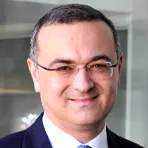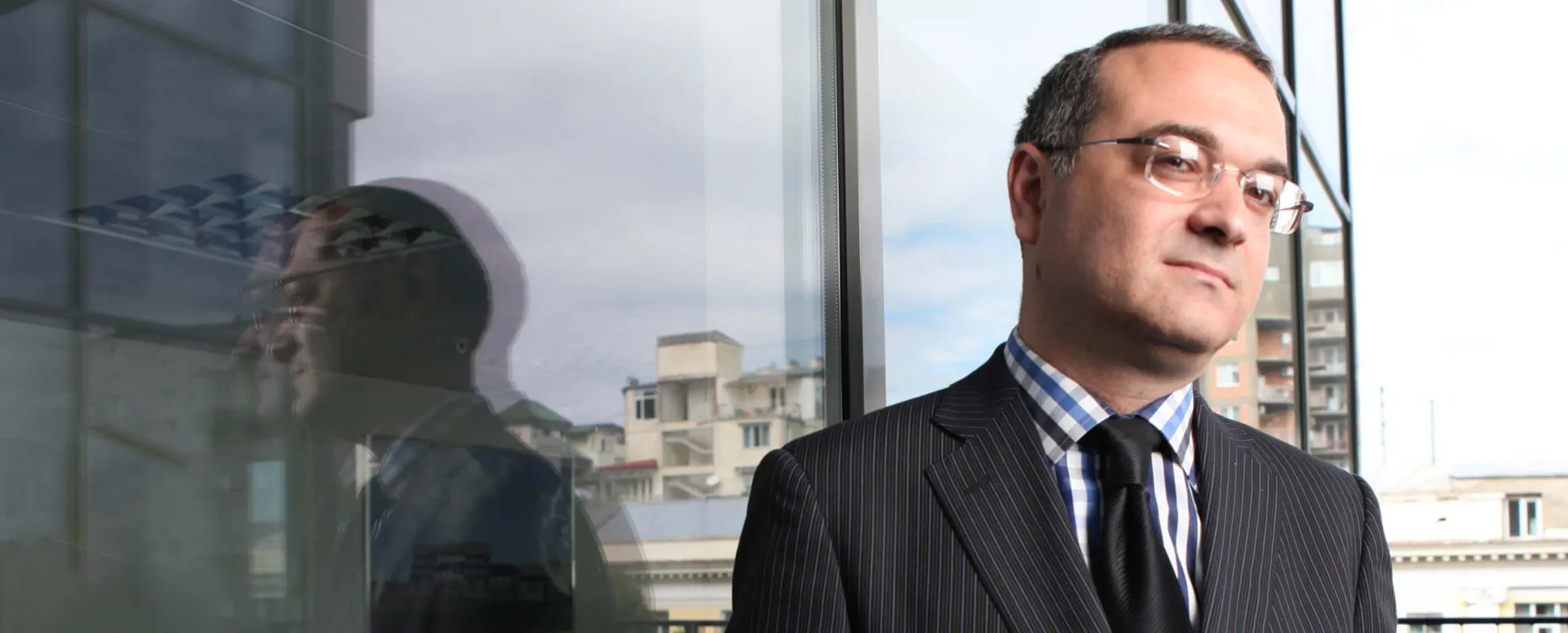An eager Guram “Guga” Tsanava arrived at the Stanford MSx program in 2011 ready to soak up as much knowledge as he could.
Born in Tbilisi, Georgia, and raised by a single mother whose life and career were upended by the collapse of the Soviet Union, the entrepreneur and investor was committed to learning as much as he could about Western-style business management and communications.
But during his year in Palo Alto, he had a pivotal conversation with former Secretary of State Condoleezza Rice — the Denning Professor in Global Business and the Economy at Stanford GSB — that set him on a road less traveled. Their conversation became the foundation for his startling decision to forgo lucrative job possibilities in the U.S. and return to his underdeveloped home country to help build its business infrastructure.
“She told me, ‘If you stay here you’d live a good life. But if you go home, you could become a game changer. It’s always better to be a big fish in a small pond than a small fish in a big one.’ That made a significant impact on me.”
We talked to Tsanava about that decision, as well as the challenges he faces in trying to lure U.S. and European investors and venture capitalists to a country that, he believes, has the potential to be a business gateway between the East and the West.
Why did Professor Rice’s advice resonate with you?
When Georgia had its war with Russia in 2008, she and President [George W.] Bush helped my country overcome some serious problems. I really admired her and was able to meet her twice when I was at Stanford. As a Stanford GSB graduate, I could have gotten a nice job with some great company. But most people who leave Georgia to study abroad don’t come back. I had a chance to return home with knowledge and experience and connections. It felt like I was doing something that would make a difference. That’s the motto of Stanford, right? Change lives. Change organizations. Change the world. I was really motivated by that.
She wasn’t the only woman to have a big impact on your life.
My mother is my role model. I was about six when she went through some hard times. We were leading a pretty good life. My grandfather was a famous railway construction manager under Soviet rule. We were among the very few families who had a private driver under communism. Suddenly, when the Soviet Union collapsed, my grandfather lost his position. My mother was working for the equivalent of the state department in Georgia, and she lost her job as well. Then, my father left us. Almost overnight, we lost everything. That was when she took over the family.
You’ve described her as resilient.
She started making pastries kind of like eclairs. After communism, corner shops were just starting up, and people were selling whatever they could because things were getting really difficult to find. So my brother and I would take the pastries out to the neighborhood to sell them. But she realized we couldn’t continue like that.
What did she do?
She had graduated from a university and was good with English. And then she learned Spanish. A friend helped her get a job with the Chinese Embassy, which was one of the first foreign embassies in Georgia. She started working there for $100 a month. From there she became the first Georgian woman to be appointed as a United Nations international senior officer. She’s retired now, but she spent more than 25 years traveling to many countries — Afghanistan, Angola, Namibia. She was almost executed in a forest in Bosnia. She has so many of those stories, and all this time she was being both a mother and father to me and my younger brother, with help from my grandmother, who helped raise us. But my mother is the one who taught me if you really want to achieve something, there are no obstacles you can’t overcome.
Any regrets about taking the riskier road after Stanford?
I’ve thought about that a lot over the years. I actually lived abroad twice. I’d lived in Paris back in the early 2000s and did have opportunities there, and then again when I was at Stanford. But it was about family. My wife and two sons were not with me, as well as my mother, brother, and grandma, so I was always thinking about them. That was the major thing. But I’ll be honest: When things get difficult here, I sometimes think maybe I should have stayed in the U.S. and led a calm life. But in the end that would have been a mistake. What I’m doing will make an impact on my country.
How specifically do you plan to improve life in Georgia?
Business. That’s the only thing that can help this country. We have to attract as much investment from outside as possible. One of the most significant opportunities is to establish a private equity culture in the country. We need new business, new companies, new ventures. The only way to do this is to create an infrastructure to make that happen. And the only infrastructure that allows that is angel investors or equity capital. But again, this is not enough. We have to raise capital from outside the country, especially from the U.S. and Europe.
How do you convince people to invest there?
Georgia has a great environment for business in terms of taxes, doing business, and government policies. It’s also well positioned strategically and logistically, in that we’re in a great location to be a hub between Europe and Asia, and we have free-trade agreements with most major countries. The people are literate and labor is cheap. Financial services are of the highest Western standards. It’s like early-stage Singapore. All we need is to communicate that to the rest of the world. I even tried to approach Elon Musk through some Stanford friends who know him, to convince him to build his companies in Georgia. I’m still on it, because if I’m successful at bringing someone of that caliber to Georgia, others would follow.
Georgia borders Russia and exists in the shadow of that superpower. Can you cite a specific way that the political landscape affects the business environment?
We’re neighbors with Russia, but that’s a problem only in terms of politics, not economics. Some people think it’s a risk, but reality shows that they don’t have clout over us. For example, we learned a very good lesson after the war with Russia in 2008. They embargoed us and put restrictions on almost everything. Russia is a huge market and everyone wants to export their products there. Before the war, it was the major market for agricultural products; but with the embargo, we had to start exporting to other countries. At the end of the day, although volumes were lower, it was a great benefit for Georgia in terms of diversifications and future growth.
Let’s switch gears a bit. How has your obsessive-compulsive disorder shaped your career?
That was not easy, to be honest. My brain works 24 hours a day, even when I’m sleeping. The worst thing about it is that when you face an issue or topic, hundreds and hundreds of contradictory arguments are floating in your mind. So I really needed to learn how to balance it and pick the right thing to do. Emotions are quadrupled.
Any positive aspects?
It helps you focus and make decisions under extreme pressure. In my early years, it was difficult, but I’ve turned that into an advantage. It makes you concentrate on the details and teaches you how to navigate which details are significant and which are not. When I was a CEO, I didn’t have time to concentrate on every single detail. But I learned to sort them out, like on an Excel spreadsheet. I wouldn’t say I’m done with it; my doctor told me I have to get used to it, and the older I get, the more I learn to live with it.
What do you feel is your primary strength in business?
My ability to connect with people and build relationships. No matter how peculiar a person may be, I can still make a connection.
And in what area do you think you can improve?
I’m emotional and sometimes that gets me into trouble. Some people can actually ignore their emotions, but I cannot. I’m not sure if that’s because of my OCD, but my emotions are a No. 1 enemy to me.
What’s the most significant business failure you’ve had, and what did you learn from that experience?
In 2015 my partners and I had a company that produced active ingredients for pharmaceutical companies. It had serious potential for us and for the country. But I gave the partners full authority. I delegated and trusted them to take care of the business, and I shouldn’t have done that. That was my failure. I should have been more heavily involved than I was. I lost one of my closest friends, and the company went bankrupt. That was one of the hardest experiences I’ve had.
Besides your conversation with Condoleezza Rice, what was the most useful lesson you learned while in the MSx program?
It was in a communication class with J.D. Schramm. Because of my OCD, I have uncontrolled movements. I move while I talk. But in that class, they videotaped me and taught me how to manage that. When I redid the presentation at the end of the class, I was radically different. Without any medication. Without any doctors. Without any physical interference. Just a great professor who taught me how to manage my physical problem.
Photos courtesy Sakhelebi Photo Studio/The Georgian Times


